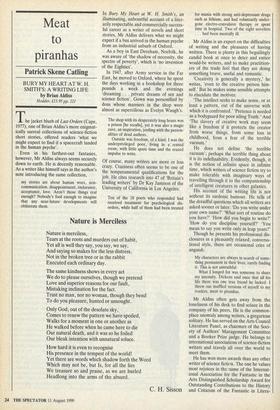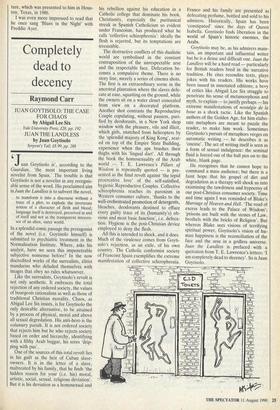Meat to piranhas
Patrick Skene Catling
BURY MY HEART AT W. H. SMITH'S: A WRITING LIFE by Brian Aldiss Hodder, £13.95 pp. 221 The jacket blurb of Last Orders (Cape, 1977), one of Brian Aldiss's more enigmat- ically surreal collections of science-fiction short stories, offered readers 'what we might expect to find if a spacecraft landed in the human psyche'.
Even in his farthest-out fantasies, however, Mr Aldiss always seems securely down to earth. He is decently reasonable. As a writer like himself says in the author's note introducing the same collection,
my stories are about human woes, non- communication, disappointment, endurance, acceptance, love. Aren't those things real enough? Nobody's fool enough to imagine that any near-future developments will obliterate them.
In Bury My Heart at W. H. Smith's, an illuminating, unboastful account of a liter- arily respectable and commercially success- ful career as a writer of novels and short stories, Mr Aldiss delivers what we might expect if a bus arrived in the human psyche from an industrial suburb of Oxford.
As a boy in East Dereham, Norfolk, he was aware of 'the shadow of necessity, the spectre of poverty', which is 'no invention of the Eighties'.
In 1947, after Army service in the Far East, he moved to Oxford, where he spent the days working in a bookshop for three pounds a week and the evenings `dreaming . . . private dreams of sex and science fiction'. Gown was personified by dons whose manners in the shop were almost as supercilious as Evelyn Waugh's.
The shop with its desperately long hours was a prison [he recalls], yet it was also a magic cave, an inspiration, jostling with the person- alities of dead authors.
Outside was freedom, of a kind. I was the underprivileged poor, living in a rented room, with little spare time and the erazed impulse to write.
Of course, many writers are more or less crazy. Craziness often seems to be one of the temperamental qualifications for the job. He cites research into 47 of 'Britain's leading writers' by Dr Kay Jamison of the University of California in Los Angeles:
Ten of the 18 poets who responded had received treatment for psychological dis- orders, while half of them had been treated for mania with strong anti-depressant drugs such as lithium, and had voluntarily under- gone electro-convulsive therapy or spent time in hospital. Two of the eight novelists . . . had been mentally ill.
Mr Aldiss is an expert on the difficulties of writing and the pleasures of having written. There is plenty in this beguilingly candid book at once to deter and entice would-be writers, and to make practition- ers of the trade feel that they are doing something brave, useful and romantic.
`Creativity is generally a mystery,' he writes, 'even to the creative person him- self.' But he makes some sensible attempts to elucidate the motives: The intellect seeks to make sense, or at least a pattern, out of the universe with which it is confronted.' Pretence is needed as a bodyguard for poor ailing Truth.' And `The slavery of creative work may seem like a freedom if it protects the creator from worse things, from some loss in childhood, from a fear of the terrible vacuum.'
He does not define 'the terrible vacuum'; perhaps the terrible thing about it is its indefinability. Evidently, though, it is the notion of infinite space in infinite time, which writers of science fiction try to make tolerable with imaginary ways of travelling through it to the companionship of intelligent creatures in other galaxies.
His account of the writing life is not without its sardonic humour. He tells of the dreadful questions which all writers are asked sooner or later: 'Do you write under your own name?' What sort of routine do you have?' How did you begin to write?' `How do you discipline yourself?' You mean to say you write only in leap years?'
Though he presents his professional dis- closures in a pleasantly relaxed, conversa- tional style, there are occasional cries of anguish:
My characters are always in search of some- thing permanent in their lives, rarely finding it. This is not untruthful.
What I longed for was someone to share my intensity. Dickens said once that all his life there was one true friend he lacked. I threw out muffled versions of myself to my readers, meat to piranhas.
Mr Aldiss often gets away from the loneliness of his desk to find solace in the company of his peers. He is the common- place anomaly among writers, a gregarious solitary. He has served on the Arts Council Literature Panel, as chairman of the Soci- ety of Authors' Management Committee and a Booker Prize judge. He belongs to international associations of science-fiction writers and travels all over the world to meet them.
He has won more awards than any other writer of science fiction. The one he values most rejoices in the name of the Internat- ional Association for the Fantastic in the Arts Distinguished Scholarship Award for Outstanding Contributions to the History and Criticism of the Fantastic in Litera- ture, which was presented to him in Hous- ton, Texas, in 1986.
I was even more impressed to read that he once sang 'Blues in the Night' with Freddie Ayer.











































 Previous page
Previous page